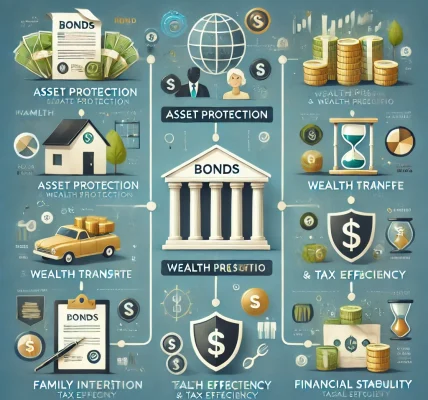Introduction
In today’s world, investors are becoming increasingly conscious of how their money impacts society and the environment. This growing awareness has fueled the rise of Environmental, Social, and Governance (ESG) bonds. These bonds not only offer potential financial returns but also allow investors to support sustainable and ethical practices. This comprehensive guide will explore ESG bonds, their benefits and risks, and how you can integrate them into your investment strategy.
What Are ESG Bonds?
ESG bonds are a category of fixed-income securities that finance projects and initiatives aligning with environmental, social, and governance principles. Companies, municipalities, and governments issue these bonds to raise capital for projects promoting sustainability, social welfare, and ethical governance.
Types of ESG Bonds:
- Green Bonds: Fund environmental projects like renewable energy and climate change mitigation.
- Social Bonds: Support social initiatives such as affordable housing, healthcare, and education.
- Sustainability Bonds: Finance projects combining both environmental and social benefits.
- Sustainability-Linked Bonds (SLBs): Tied to issuers achieving specific ESG performance targets.
Why Invest in ESG Bonds?
Investing in ESG bonds can provide both financial returns and a sense of purpose. Here are key reasons to consider these bonds:
- Positive Impact: Directly support environmental sustainability and social welfare.
- Portfolio Diversification: Enhance risk management by including socially responsible assets.
- Regulatory Support: Increasing government and global regulatory emphasis on sustainable finance.
- Reputation Management: Issuers and investors alike can enhance their public image by supporting ethical initiatives.
How Do ESG Bonds Work?
Like traditional bonds, ESG bonds pay periodic interest (coupon) and return the principal amount at maturity. However, their proceeds are earmarked for specific ESG-related projects. Sustainability-linked bonds (SLBs) may feature financial penalties if issuers fail to meet pre-set sustainability goals.
Evaluating ESG Bonds: Key Considerations
When evaluating ESG bonds for your portfolio, consider the following factors:
- Issuer Credibility: Verify the issuer’s track record in ESG commitments.
- Third-Party Verification: Look for independent reviews by organizations like Sustainalytics or MSCI ESG Ratings.
- Transparency: Ensure clear reporting on how funds are allocated and their impact.
- Financial Performance: Assess the bond’s yield, credit quality, and maturity period relative to other investments.
Risks Associated with ESG Bonds
While ESG bonds present unique benefits, they also come with risks:
- Greenwashing: Some issuers may overstate or misrepresent their ESG credentials.
- Lower Yields: ESG bonds may offer lower returns compared to traditional bonds.
- Market Liquidity: Limited supply can make trading ESG bonds more challenging.
- Regulatory Uncertainty: Evolving ESG standards can impact valuations and compliance.
How to Invest in ESG Bonds
- Direct Purchase: Buy individual ESG bonds through brokers or financial institutions.
- ESG Bond Funds: Invest through mutual funds or ETFs specializing in ESG bonds.
- Government Programs: Explore sovereign green bonds issued by governments.
ESG Bond Performance: What to Expect
While ESG bonds may offer competitive returns, performance can vary based on market conditions, issuer quality, and project outcomes. Historically, ESG bonds demonstrate resilience during market downturns due to their long-term societal value.
The Future of ESG Bond Investing
The ESG bond market is poised for significant growth as global concerns about climate change and social equity intensify. With more investors prioritizing ethical finance, innovations like transition bonds and blue bonds (focused on ocean sustainability) may further diversify ESG offerings.
Conclusion
ESG bonds present a compelling opportunity for investors seeking both financial returns and positive societal impact. By carefully evaluating issuers, seeking independent verification, and staying informed on market developments, you can align your investment portfolio with your ethical values while potentially enhancing long-term returns.
Always consult with a financial advisor to ensure ESG bonds align with your overall investment objectives and risk tolerance.



